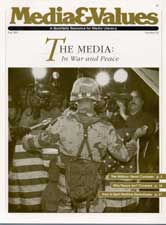Lessons Learned: How to Evaluate War Reporting
|
This article originally appeared in Issue# 56
|
Learnings from the first Gulf War.
In coverage of the war in the Middle East, as in coverage of earlier wars, "quicker" seemed to be better, and "quickest" best. From Edward R. Murrow's descriptions of the London bombings during World War II, through television's sweeping nightly coverage of the Vietnam War, a trend toward immediacy developed which today manifests itself as the modus operandi for American television news. This ratings-fueled production ethic, however, may have compromised the effective mass communication vital to sustaining our democracy. Despite the volume of wartime information available through the media, details can be distracting, especially those that come from television coverage. Viewers are left with simplistic impressions, pro or con, of the war. "Nintendo"-like electronic pictures from a single sortie over Baghdad convey little about the feelings and attitudes of the crew, or the people below.
Further impeding the news process during the war and simultaneously depriving viewers of the opportunity to process "facts," yesterday's "photo opportunities" are reduced to today's "electronic handouts." The Pentagon orders that correspondents be escorted by the military around battle areas, and that their reports be subject to security review. Under such a scenario, the reporter is not gathering news in the traditional sense, but is merely the conduit for military spokespersons. Inevitably, the responsible reporter risks being perceived as a player, not an objective observer.
Total objectivity is an impossibility. There will always be one more horrific picture to potentially alter the story. Thus pain comes not only from war, but from the coverage itself.
Few would argue that the famous Vietnam-era footage of the young girl running for her life while on fire from a napalm strike had a strong effect on anti-war sentiment. Nevertheless, others would correctly point out that Vietnam coverage included no pictures of our POWs being tortured and maimed, or of our own infantrymen, some only slightly wounded in battle, killed by a single shot to the head. These pictures did not make the evening news. So it seems that even if the press were free to pursue stories with minimal restrictions, as it was in Vietnam, no consensus would be reached regarding the reality of the war.
What can be reasonably expected from reporters so that the Gulf War, or any future conflict, can be comprehended and acted upon accordingly?
First, a concerted effort should be made to suspend the race to be first, offering less trivial coverage and replacing the reporter's instant insights and speculation with the honesty and simple humility of an occasional, "We don't know."
Second, prospects for peace should be explored with the same immediacy as the picture of hostilities presented during the war. Substantive reporting should continue well beyond the cessation of hostilities.
Third, the media need to prepare to cover the inevitable diplomatic efforts that will be required to make a lasting peace at war's end. Substantive background pieces on various peoples and governments in the region are needed.
Fourth, when the shooting stops, the media should continue to present substantive reports on the myriad issues facing the region. In the Middle East, the media must forthrightly analyze such topics as the relationships between the governing and the governed in the region, the equitableness in the control and distribution of oil, and, inevitably, the potential for Palestinian/Israeli accommodation.
Finally, until the shooting war ends, news media must act thoughtfully and soberly to ensure that television news covers the hellish reality of war.
Vietnam veteran and author Tim O'Brien states: "As the first rule of thumb, therefore, you can tell a war story by its absolute and uncompromising allegiance to obscenity and evil." Stories from the theater of war, regardless of how well-crafted, which fail to convey the two-sided horror of this or any other war should be discounted as inept in the best case, and dismissed as purveyors of propaganda at worst. A less critical, more passive response encourages the perpetuation of the myths of war, and thereby keeps the horror of war remotely intact.
Total objectivity is an impossibility. There will always be one more horrific picture to potentially alter the story.



